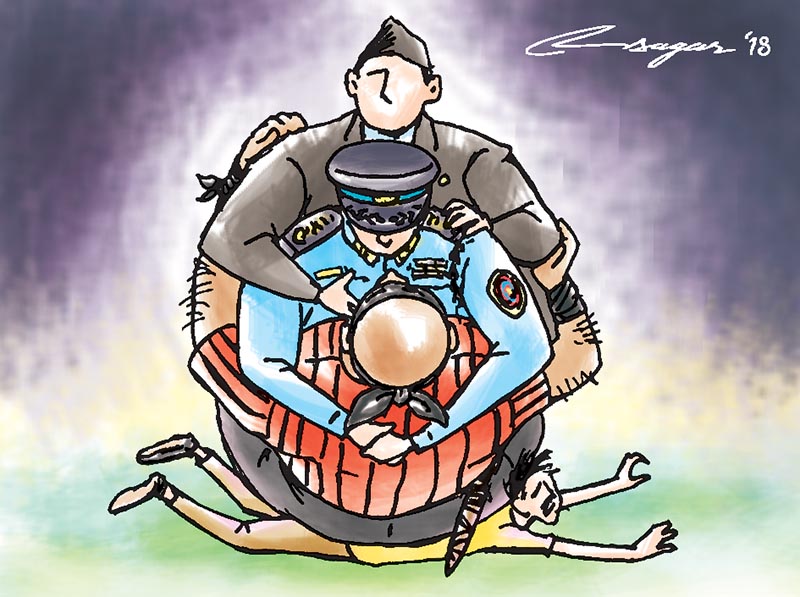Policing in Nepal: Paradigm shift needed
Nepal Police faces some organisational problems, but more importantly there is a nexus between police, politicians and criminals, which has not only weakened law enforcement bodies but also impacted crime investigation and justice delivery
Nepal Police has a history of being nourished by “freedom fighters”. Therefore, it is still overwhelmed by regimental character. Some South Asian police also carry the colonial culture of policing—enforcing the will of the government rather than acting as law enforcers. In colonial era, the police used to be a force that could quell any political rebellion.
The primary function of the police was maintaining law and order. Prevention and detection of crime were almost an extra function and intelligence gathering was prioritised as a means of “keeping the rulers informed about the activities of opposing parties or dissidents”. So it had to be extremely hierarchical, strictly disciplined and militaristic. Now these types of mindset have to change.
Nepal Police has some organisational problems which require immediate redress. This article discusses three such problems—administration and management, crime investigation and insulation of police from political influence. The government, through due political processes, makes laws and by-laws for police. There are hardly any grudges against this. However, there is no established mechanism in Police Act 1955—or policy in practice—that indicates the limits of political “supervision” and “control” of the police force or any mechanism as such to issue “directives” to police. There is no any specific role of the Ministry of Home Affairs defined in relation to the police administration. As a result, sometimes appointments, transfers and promotions within the police force have been an issue of public ire.
Political influences on these matters lead to sponsored hegemony and patronage on the one hand, and uncertainty, insecurity and despair among the police, on the other. It is for this reason that a long-term and effective arrangement needs to be made to address such problems.
Investigation of criminal acts and maintaining law and order are two vital and specific police functions. There come some moments, as in recent rape and murder of Nirmala Panta case, when police are criticised for their failure to investigate criminal offences scientifically. The perpetrators can only be served proper punishment through rightful investigation by police, which must be supported by corroborated evidences. Any police investigator who fails to this duty should not be given such responsibilities. Today’s policing depends more upon intelligence rather than other physical logistics. This valuable intelligence is attained through relentless hard work and research endeavours. Many police officers lack these.
Criminal intelligence is the backbone of policing. However, many police departments pay less attention to its progressive development for proficiency. The culture of developing criminal intelligence requires commitment, dedication and relentless investment in terms of painstaking labour, time and resources. It is an age of science therefore the police must keep abreast with the modern technology. Nepal Police has a separate crime investigating department. However, the manpower lacks orientation and skills to carry out the job. Personnel from various other police units, who have different job nature, are transferred to crime investigating agency. In order to encourage specialisation and upgrade overall performance of the police in indisputable manner, the Crime Investigation Bureau must have separate police personnel system. Additionally, police have been criticised for the lack of collaboration, sharing of intelligence and cooperation across the separate policing jurisdictions. At times this failure has directly jeopardised investigations that smother justice.
One of the major problems in Nepal is the criminal-police-politician nexus. Criminal elements thrive on wrongdoings and they need someone to stop the police from getting into action. They also need the co-operation of bureaucracy to regularise their illegal activities. Police and bureaucrats are also in need of political patronage to ensure “comfortable” postings and “smooth’ advancement in career. As a result, a symbiotic relationship is created between criminal elements, police and politicians. When a politician reaches a particular stature and develops a clout, he dictates his terms to police and bureaucracy much to the delight of criminal elements. The bond becomes stronger and they cannot survive without the help of each other and then comes a stage when all of them become members of an “organised criminal gang”. They are so powerful that they can affect bureaucracy, muzzle press and even influence judiciary.
Since police and bureaucracy act as catalysts for the growth of the nexus between politicians and criminal elements, it is necessary to set them apart. To make the police and bureaucracy people-oriented and to make them act without fear or favour, control of politicians over them should be carefully structured. The formation of an apolitical body to administer internal affairs of police could be one way to check irregularities in police. This arrangement will not only protect police from political hegemony but also make them accountable and justice accessible. It will also strengthen rule of law and democracy in the country.
Thapa, a retired additional inspector general, is associated with Centre for Security and Justice Studies






